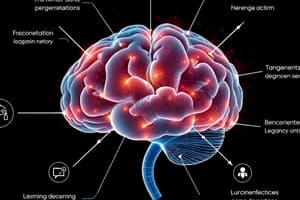Podcast
Questions and Answers
What distinguishes learning from memory?
What distinguishes learning from memory?
Which of the following best describes an unconditioned stimulus?
Which of the following best describes an unconditioned stimulus?
In operant conditioning, what type of reinforcement involves the removal of an unpleasant stimulus?
In operant conditioning, what type of reinforcement involves the removal of an unpleasant stimulus?
Which schedule of reinforcement is most effective for making behaviors resistant to extinction?
Which schedule of reinforcement is most effective for making behaviors resistant to extinction?
Signup and view all the answers
What characterizes episodic memory?
What characterizes episodic memory?
Signup and view all the answers
What effect does the forgetting curve describe?
What effect does the forgetting curve describe?
Signup and view all the answers
Which of the following describes procedural memory?
Which of the following describes procedural memory?
Signup and view all the answers
What is positive punishment in operant conditioning?
What is positive punishment in operant conditioning?
Signup and view all the answers
How does classical conditioning differ from operant conditioning?
How does classical conditioning differ from operant conditioning?
Signup and view all the answers
What does proactive interference primarily disrupt in memory?
What does proactive interference primarily disrupt in memory?
Signup and view all the answers
Which of the following is an example of retroactive interference?
Which of the following is an example of retroactive interference?
Signup and view all the answers
Which of the following best describes flashbulb memories?
Which of the following best describes flashbulb memories?
Signup and view all the answers
In operant conditioning, which schedule provides reinforcement after an unpredictable number of responses?
In operant conditioning, which schedule provides reinforcement after an unpredictable number of responses?
Signup and view all the answers
What does latent learning refer to in cognitive learning theories?
What does latent learning refer to in cognitive learning theories?
Signup and view all the answers
What is the primary function of the hippocampus in memory formation?
What is the primary function of the hippocampus in memory formation?
Signup and view all the answers
Which of these processes involves converting input into memory?
Which of these processes involves converting input into memory?
Signup and view all the answers
What is true about short-term memory?
What is true about short-term memory?
Signup and view all the answers
Which statement correctly describes extinction in classical conditioning?
Which statement correctly describes extinction in classical conditioning?
Signup and view all the answers
Eyewitness testimonies are often considered unreliable primarily due to which of the following factors?
Eyewitness testimonies are often considered unreliable primarily due to which of the following factors?
Signup and view all the answers
Which method of problem-solving relies on a strict, sequenced approach to reach a solution?
Which method of problem-solving relies on a strict, sequenced approach to reach a solution?
Signup and view all the answers
What feature distinguishes System 1 thinking from System 2 thinking?
What feature distinguishes System 1 thinking from System 2 thinking?
Signup and view all the answers
How do schemas assist in cognitive processing?
How do schemas assist in cognitive processing?
Signup and view all the answers
In the context of mental imagery, what happens when you imagine an experience?
In the context of mental imagery, what happens when you imagine an experience?
Signup and view all the answers
What best describes a prototype in cognitive psychology?
What best describes a prototype in cognitive psychology?
Signup and view all the answers
Which of the following statements about heuristics is accurate?
Which of the following statements about heuristics is accurate?
Signup and view all the answers
What is an example of insight in problem-solving?
What is an example of insight in problem-solving?
Signup and view all the answers
Which statement captures the relationship between inputs, processing, and outputs in cognitive science?
Which statement captures the relationship between inputs, processing, and outputs in cognitive science?
Signup and view all the answers
Which of the following best defines concepts in cognitive psychology?
Which of the following best defines concepts in cognitive psychology?
Signup and view all the answers
What is a critical characteristic of System 2 thinking?
What is a critical characteristic of System 2 thinking?
Signup and view all the answers
Which heuristic can lead to the misconception that shark attacks are common?
Which heuristic can lead to the misconception that shark attacks are common?
Signup and view all the answers
What does Sternberg's theory argue is missing from traditional IQ tests?
What does Sternberg's theory argue is missing from traditional IQ tests?
Signup and view all the answers
What defines General Intelligence (g) according to Charles Spearman?
What defines General Intelligence (g) according to Charles Spearman?
Signup and view all the answers
Which statement accurately reflects the findings from twin studies on IQ?
Which statement accurately reflects the findings from twin studies on IQ?
Signup and view all the answers
What is the primary focus of Confirmation Bias?
What is the primary focus of Confirmation Bias?
Signup and view all the answers
Which type of intelligence is best described as the ability to handle everyday tasks?
Which type of intelligence is best described as the ability to handle everyday tasks?
Signup and view all the answers
What does an IQ of 100 signify in terms of mental age and chronological age?
What does an IQ of 100 signify in terms of mental age and chronological age?
Signup and view all the answers
Which statement about the Representativeness Heuristic is correct?
Which statement about the Representativeness Heuristic is correct?
Signup and view all the answers
What is the main argument against the validity of the Stanford-Binet Test in measuring intelligence?
What is the main argument against the validity of the Stanford-Binet Test in measuring intelligence?
Signup and view all the answers
What physiological effects might be observed when employing System 2 thinking?
What physiological effects might be observed when employing System 2 thinking?
Signup and view all the answers
Study Notes
Computational Theory of Mind
- Cognitive science views the brain as an information-processing device.
- This process involves inputs being processed and then generating outputs.
- Example: When you see a red light, your brain processes this input and sends an output to press the brake.
Thinking and Mental Imagery
- Thinking involves creating mental representations.
- Mental imagery refers to imagining visual or auditory stimuli; for example, picturing a face or hearing a song in your head.
- Your brain creates these images or sounds without actual external stimuli.
- The same areas of your brain are activated whether you are imagining something or experiencing it for real.
Schemas, Concepts, and Prototypes
- Concepts are mental groupings or categories (like "cars" or "trees").
- Concepts help you organize and simplify the world.
- Prototypes are the most typical examples of a concept; for example, a robin is more typical of a bird than an ostrich.
- Schemas are networks of interconnected concepts; for example, a "food" schema could connect to "vegetables," which could then connect to "broccoli."
- Schemas and concepts reduce mental effort and are crucial for higher-level thinking.
How We Solve Problems
- There are various methods for problem-solving:
- Heuristics: Mental shortcuts or "rules of thumb." They are fast but not always accurate.
- Algorithms: Step-by-step procedures (e.g., formulas, recipes). They are slower, but reliable if applied correctly.
- Insight: Sudden realizations or "Ah-ha!" moments. Often leads to creative or innovative solutions.
Dual Systems of Thinking
- There are two systems of thinking:
- System 1: Fast, automatic, and effortless. It's often used for quick judgments.
- System 2: Slow, deliberate, and effortful. Requires focus and is used for more complex tasks.
- Physiological effects: Your heart rate might increase, and your pupils dilate when using System 2.
Heuristics
- Availability Heuristic: Judging how common something is based on how easily it comes to mind; for example, people often think of shark attacks as common because they’re widely reported, but they’re statistically rare.
- Representativeness Heuristic: Assigning something to a category based on how closely it fits the "prototype" of that category; for example, if someone wears glasses and loves books, you might assume they're a librarian even though they might be a lawyer.
Confirmation Bias
- We tend to focus on information that confirms our existing beliefs and ignore information that contradicts them.
Intelligence
- General Intelligence (g): A single factor thought to underlie all cognitive abilities.
- IQ (Intelligence Quotient): Measures "mental age" relative to "chronological age." If mental age matches true age, IQ = 100.
- Binet’s IQ Test: Originally designed to identify children who needed special education in French schools.
- Stanford-Binet Test: The most famous IQ test, later revised in the U.S.
Environmental Influence on IQ
- Twin Studies: Studies show genetics and environment both influence IQ.
- Identical twins raised together tend to have very similar IQ scores, which shows the strong genetic influence.
- Non-twin siblings raised together have lower IQ correlations, showing that environment also plays a role.
Sternberg’s Triarchic Theory of Intelligence
- Three Types of Intelligence:
- Analytical Intelligence: Problem-solving and abstract thinking (e.g., math skills).
- Practical Intelligence: The ability to handle everyday tasks and adapt to new situations.
- Creative Intelligence: The ability to come up with novel and innovative solutions.
- Sternberg argued that traditional IQ tests only measure analytical intelligence, missing practical and creative aspects.
Emotional Intelligence
- Components:
- Self-awareness: Understanding your own emotions and how they affect your behavior.
- Self-regulation: Managing your emotions effectively and controlling impulsive behavior.
- Motivation: Setting goals, staying focused, and being persistent.
- Empathy: Understanding and sharing the emotions of others.
- Social Skills: Building strong relationships, communicating effectively, and working well in teams.
Studying That Suits You
Use AI to generate personalized quizzes and flashcards to suit your learning preferences.
Description
Test your knowledge on key concepts in psychology related to learning and memory. This quiz covers topics like operant conditioning, types of memory, and the mechanisms of forgetting. Challenge yourself to understand the intricacies of cognitive processes and their applications.




